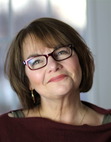You Are What You Read
A Guest Post
By Jamye Shelleby
Not too long ago, I went through a writing identity crisis. After years of calling myself a fiction writer—through my MFA, through revisions of my novel—I found that I no longer thought about writing fiction. I'd stopped narrating my everyday life as I'd once done; I'd stopped making up backstories for the cashiers at the grocery store. I knew I was still a writer, but I hadn't finished a piece in years, and worse, I didn't have any new ideas. If I wasn't a fiction writer, who was I?
As is so often the case, it took a lot of examination for me to reach a very obvious answer: My writing life is a reflection of my reading life.
During my prior prolific writing years, I read a lot of fiction. I subscribed to the New Yorker and other literary magazines, and faithfully read the Best American anthologies. I read a handful of fresh-off-the-press novels throughout the year as well. In fact, I read very little of anything else. The writing came naturally, a compulsion, really, in response to the works I was reading.
Then I had my first child, and my reading time shrank. With the time I had left, I found myself gravitating toward nonfiction parenting books and magazines that would tell me what in the world to do with this little being I was now in charge of raising. My fiction reading was whittled away…and consequently, so was my fiction writing.
[image error]It took two more children and the identity crisis for me to fully understand the impact that my reading habits had had on my thought patterns. My brain is hardwired to write. But the paths of language are malleable. The style and tone and voice conform to what I'm inputting.
You know how when you fall in love with an author's voice, it gets stuck in your head and you start thinking like them? You find yourself making their jokes, employing their verbal tics. Most times, it's not a conscious decision. Their style becomes part of your thinking pattern, and you mimic them.
Similarly, when I'm reading a lot of fiction, I start thinking in terms of fiction. I narrate my own life, thinking in terms of metaphor, describing life in the moment of living it. Looking down at my son in the kitchen, the words will involuntarily come: The banana peel fell over my son's hand like the opened petals of a lily.
Likewise, if I'm reading a lot of poetry, I start looking for meaning in the every-day motions of the world. If I'm reading a lot of blog posts, my narration style becomes more journal-like, addressing an invisible reader. If I'm reading a lot of social media, I compose short quips as I go through my day.
I write what I read.
So it naturally follows that if I'm not producing as much fiction as I'd like, then the first thing I'd better do is start reading more fiction. More fiction than other things, which is not to say, to the exclusion of blogs, or parenting books, or whatever. But more fiction than other things. So that it becomes not only possible, but necessary, for me to create a world and sustain it. So that when I sit down to actually write, my brain is already turned ON. I don't have to "flip the switch," because I'm living with the switch flipped.
I saw the power of this truth just a month ago when I was reading The Grapes of Wrath, and alongside it, Working Days, the journal John Steinbeck kept as he wrote the novel. (I highly recommend this exercise to fiction writers.) I couldn't help but often apply what Steinbeck was writing about in his journals to myself, and spurred on by the brilliance of his storytelling, I found that I was thinking throughout my day about my own novel.
If I want to write a good novel, this is how I need to spend my reading time. It's as simple—and yet as difficult—as that. At this point in my life, this requires discipline. Because I have to be honest: when my three whirwinds of boys go to bed each night, the temptation to reach for an easy read (or a TV show) over a good piece of literature is strong.
This is a decision I have to consciously make, but one I never regret making. I experience the rewards in the satisfaction of doing what is right by my creative self, not to mention to do what is right by the people who inhabit my worlds, who are asking me to give them life, and are waiting, patiently, for me to have the right frame of mind to do it.
[image error]Jamye Shelleby holds and MFA in Fiction from Virginia Commonwealth University. Recently her nonfiction has appeared in MomSense magazine.She lives in Pennsylvania with her family. She is also a member of the original Grub Street Master Novel 'Council.'



